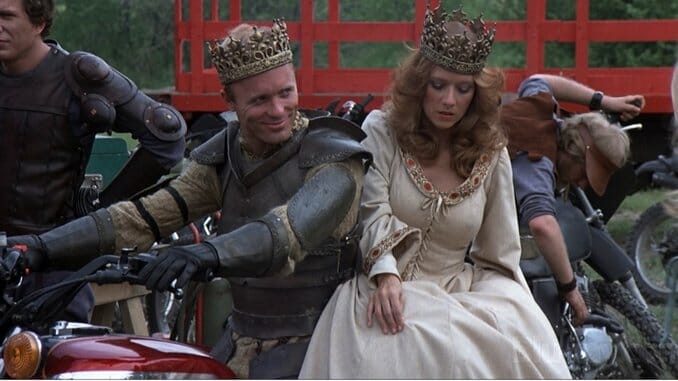In Knightriders, George Romero Made His Own Camelot
For one brief and shining moment, anyway.

George Romero will always be known as the man who gave us the modern zombie movie, a genre of horror with social commentary that’s always strongly underpinned by narratives that involve the breakdown of a society. Whether that society is a group of strangers thrust into a secluded farmhouse or a high-walled bastion of the privileged, the narratives of his most iconic works dealt in tragedy that stemmed from greater ills. It’s strangely apt, then, that a movie that sounds as ridiculous as his 1981 film Knightriders is sort of the same kind of story: a group of people faced with an untenable situation, all aware that they may be, in a sense, doomed.
Romero sets Knightriders in contemporary times, following a ragtag traveling show whose players dress up like medieval knights and entertainers and put on a jousting tournament … on motorcycles. The movie follows the tragic arc of their king, troupe leader Billy (Ed Harris) as he stubbornly insists on holding to the original values of his unique little group, all while the outside world’s authorities and temptations try to pull apart the family that he’s brought together.
This is a film with portentous visions of doom, cheery hangout sessions between roadies, motorcycle stunts that will make any biker who has wiped out at least once cringe down to their marrow, and a Merlin who can blow a mean harp (storyteller Hugh Morgan Hill, who performed as Brother Blue and unbelievably never really starred in anything else). It is a movie where Harris, dressed in a full knight get-up, calmly sits opposite a police officer at a McDonald’s booth before punching him in the face.
As the movie turns 40 this month, it’s a good opportunity to look back on it as a sort of odd-man-out in Romero’s storied portfolio that is equal parts hilarious and heartwarming, so unlike and yet strangely resonant with all his better-known zombie films.

From the first scene, we know Billy is keenly aware that something is after him. He keeps seeing visions of a crow that he believes presages some downfall. (It even bothers him while he bathes naked in a stream with his Lady Guinevere, Linet, played by Amy Ingersoll.) Of course, any mysticism or enchantment going on here is of the symbolic or foreshadowing variety. When Billy voices his concerns about it, Merlin tells him that his own jitters over it are just as likely to be the source of that eventual disaster as any design of fate. It sets the tone for the whole movie, which stays down-to-earth the whole time, even as it contains story beats right out of old epics.
Billy and his troupe roll into a town and put on a full medieval tournament, attracting the attention of the bloodthirsty, unsophisticated locals (including Romero’s longtime collaborator Stephen King and his real-life wife Tabitha King, in a hilarious cameo). Billy’s knights joust in full-contact tournaments using carefully crafted stage weaponry. It’s all supposed to be good-natured fun, but Morgan (Tom Savini) and Alan (Gary Lahti) are playing rough. The tournament ends with Billy hopping astride his own hog to tilt at Morgan himself, ending in his being unhorsed and at risk of losing his crown to Morgan until his loyal retinue swoops in to same him.
Billy is injured but recovers swiftly to the relief of his found family. But it foreshadows his absolute stubbornness and heedlessness. He’s so principled he won’t even autograph a magazine for a little kid. What happens when people start to think of him as the next Jim Jones or Charles Manson, he asks, completely in earnest. Billy has ideals, the sort that force him into physical danger to prove a point to his knights, and inevitably get him in trouble with corrupt local law enforcement when he refuses to grease the palm of a crooked deputy.
This ultimately leads to a late-night drug raid that lands one of Billy’s drivers in jail, and against all good sense and the protests of his fellows, Billy demands to be thrown in the can in solidarity with his friend. After getting worked over by the cops and bailed out by a friend, Billy finds that his troupe has moved on to the next town without him against all his orders. At the same time, a talent scout comes along trying to get the crew to sign away their souls for a big contract, and Alan is finding himself more and more lured away by the young woman who’s run away from home to join their little band.

